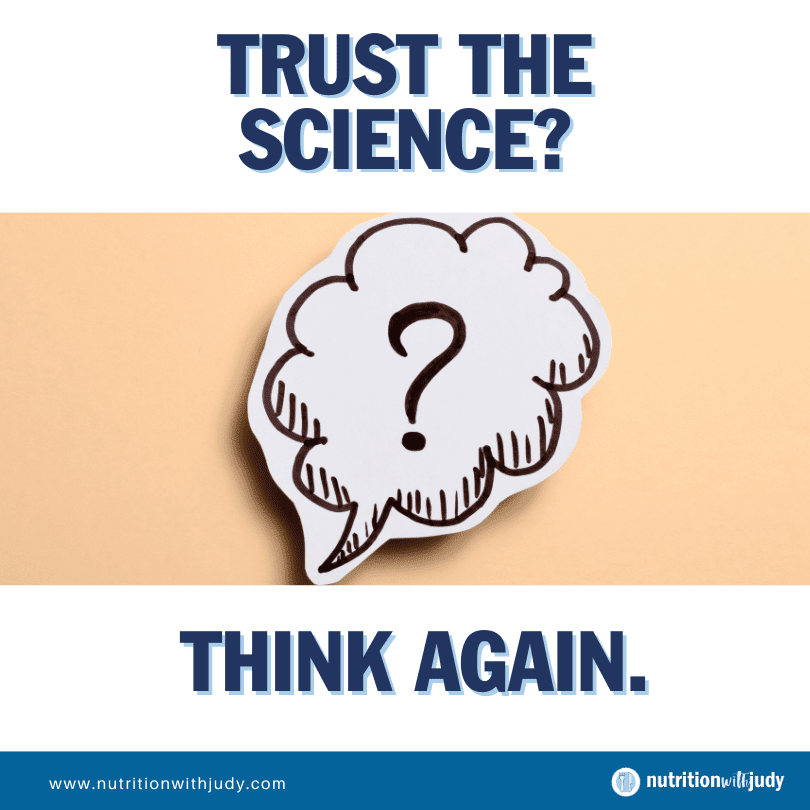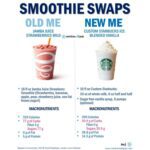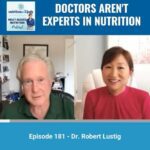

Trust the Science? Think Again.


I have been a college professor in the field of Natural Sciences for the past twenty years. I used to be a big believer in the sanctity of scientific processes and the inherent methodology of the scientific method. I thought if you followed all the processes, created a null hypothesis, collected and analyzed all the data, you would be able to generate an easily replicated conclusion to gain information, inform decisions and voila… you have concrete scientific evidence.
I still believe this is true.
If you follow the processes, collect and analyze all the data, you can draw meaningful and functional conclusions about the natural world. Science is beautiful in its pure, uncorrupted state.
But unfortunately, uncorrupted and pure science is becoming increasingly difficult to find.
As a writer and nutritionist for Nutrition with Judy I know I have to cite scientific studies for my material to be considered valid.
And I do.
However, well-conducted, unbiased studies are becoming more challenging to locate. A significant amount of doubt has crept into my consciousness when reading and evaluating peer-reviewed studies, which are still considered the gold standard in science.
Tier One academic research institutions are becoming increasingly captured by industry. This means that we have corporate funders funding scientific research at academic institutions and desiring specific research outcomes.
There is ample evidence that the source of funding does predict the outcomes of the studies. For example, it was reported in a journal that “in no case was a therapeutic agent manufactured by the sponsoring company found to be inferior to an alternative product manufactured by another company.”
The study found that when a pharmaceutical company provides funding for a study, odds are the outcomes are more likely to favor the therapy being studied.
Additionally, the scientists who carry out the research themselves are only doing one piece of the entire scientific process.
It used to be that to attain a PhD in the natural sciences, a candidate had to design and implement a scientific research study from start to finish and then defend it in a dissertation defense.
Now, increasingly we see students being awarded Ph.D.s’ who simply join an existing study, organized by someone else and funded through a corporate sponsor. The student simply does one small component of the study. For this, they are awarded a Ph.D. They may not have a depth of knowledge about the entire scientific process in practice but rather just theoretical knowledge.
“Scientists” have just become another cog in the machine.
I find this problematic, and we see the results of this lack of depth of knowledge play out in modern society in several ways. We see it, especially when we examine the health of our population and the health of our land.
If you’re reading this article, you are well-versed in nutrition science and what the data tells us about “healthy eating” published in nutrition journals. These all point to the U.S. Myplate way of eating, resulting in skyrocketing rates of obesity, diabetes, metabolic dysfunction, and cancer.
Intuitively, we know we shouldn’t be eating 8-12 servings of carbohydrates per day but when industry funds studies, this is precisely the results one would expect to find.
We also observe this phenomenon occurring in how pharmaceutical drugs gain approval.
According to Johann Hari, an investigative journalist with the New York Times and author of the book, Lost Connections:
“The vast majority of research into whether drugs work or not, is funded by big pharmaceutical companies. They do this research for a specific reason, they want to market those drugs for profit. That’s why the drug companies conduct their scientific studies in secret, and afterward, they only publish the results that make their drug look good or that make their rivals’ drugs look worse…This is called ‘publication bias.’”
“Of all the studies drug companies carry out, 40 percent are never released to the public, and lots more are only released selectively, with any negative findings left on the cutting room floor.”


When a physician prescribes a drug to treat a specific condition, the studies your doctor read may be missing some key metrics. How can we make informed decisions about our health when we can’t trust the published scientific data?
Luckily, there is a workaround for this for people who know and are willing to dig a little deeper. You can get all trial data from pharmaceuticals or any other published scientific study through the Freedom of Information Act. Only then do we have access to all the data from the trials, and it sometimes looks quite different from the published data.
But if you believe the journals are legitimate, you are only getting part of the story.
According to Hari, “The rules they have written are designed to make it extraordinarily easy to get a drug approved. All you have to do is produce two trials-any time, anywhere in the world-that suggest some positive effect, that’s enough. So you could have a situation in which there are one thousand scientific trials, and 998 find the drug doesn’t work at all, and two find there is a tiny effect—and that means the drug will be making its way to your local pharmacy.”
A drug only has to be at most, minimally effective. If a published study shows a drug is useless, then the publication can be sued. According to an article in The New York Times, “A California company [Immune Response Corporation] tried to block publication of a scientific paper that showed its H.I.V. vaccine was not effective, and it has asked for damages of more than $7 million from the universities and researchers who published the findings.”
We also see examples of pharmaceutical or big agricultural companies sponsoring doctor and nutrition conventions, including determining who can present at these events and speak at these professional meetings.
As it states in this Washington Post article, “…pharmaceutical companies mailed attendees hundreds of free phone cards, as well as invitations to museums, jazz concerts, and fancy dinners…And in several dozen symposiums during the weeklong meeting, companies paid the APA (American Psychiatric Association) about $50,000 per session to control which scientists and papers were presented and to help shape the presentations.”


The problem with corporate capture is that trust is being eroded. The public, and rightly so, no longer trusts scientific institutions, so where does that leave us?
As Richard Horton, editor of The Lancet, recently reported, “Journals have devolved into information laundering operations for the pharmaceutical industry.”
Moving forward, we shouldn’t view peer-reviewed scientific publications as the end-all, be-all. We have to experiment with ourselves and listen to our body’s innate wisdom. Listen to our gut feeling.
Additionally, we should try things ourselves and see if they help us or not. Most importantly, we should reconsider or be skeptical of pharmaceutical interventions. If lifestyle changes can give us similar or better results, it is probably a worthwhile endeavor to try that first.


By returning to living more in accordance with our human biology through eating a meat-based diet, getting out in the sun, and making real, lasting human connections, we can become less reliant on modern medicine.
If you would like to get specific recommendations on how you can do this, consider taking the Symptom Burden Assessment and connecting with a Nutrition with Judy nutritionist.
DISCLAIMER: The content is for educational purposes only. While I am board-certified in holistic nutrition and a nutritional therapy practitioner, I am not providing medical advice. Whenever you start a new diet or protocol, always first consult with your trusted practitioner.



